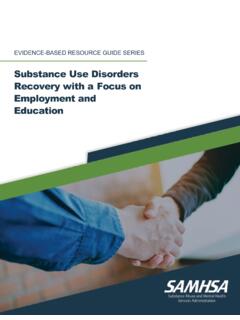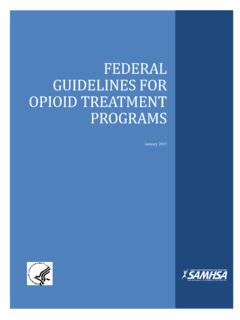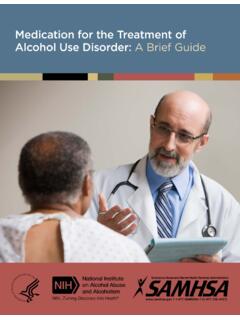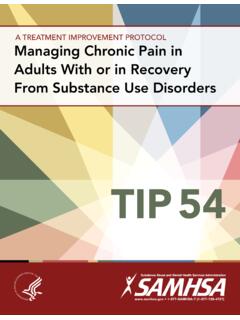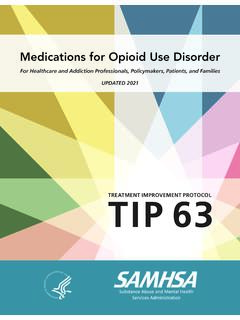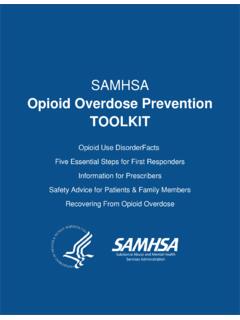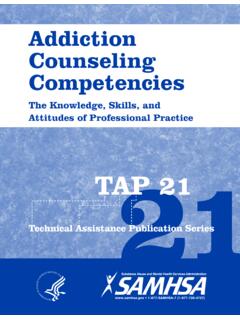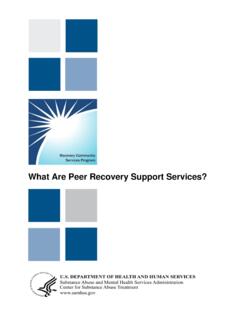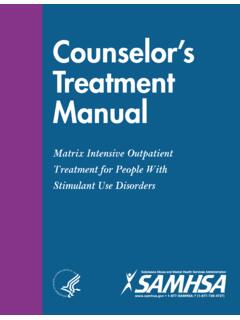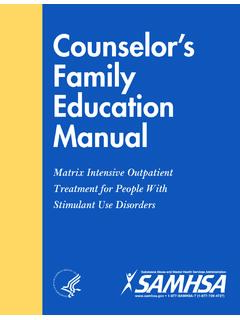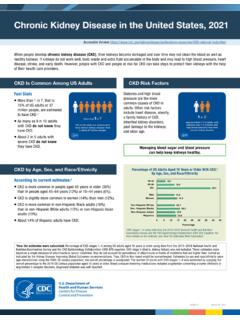Transcription of Updated 2019 ANGER - Substance Abuse and Mental Health ...
1 Updated 2019 ANGER MANAGEMENT for Substance Use Disorder and Mental Health Clients A Cognitive Behavioral Therapy Manual This page intentionally left blank ANGER Management for Substance Use Disorder and Mental Health Clients A Cognitive Behavioral Therapy Manual Updated 2019 Patrick M. Reilly, Michael S. Shopshire, DEPARTMENT OF Health AND HUMAN SERVICES Substance Abuse and Mental Health Services Administration Center for Substance Abuse Treatment 5600 Fishers Lane Rockville, MD 20857 ANGER MANAGEMENT for Substance Use Disorder and Mental Health ClientsAcknowledgments Numerous people contributed t o the development of this manual (see appendix). The publication was written b y Patrick M. Reilly, , and Michael S. Shopshire, , of the San Francisco Treatment Research Center. Sharon Hall, , was the Treatment Research Center s Principal Investigator. This publication is, in part, a product of research conducted with support from the national Institute on drug Abuse , Grant DA 09253, awarded t o the University of California San Francisco.
2 The research for this publication was also supported b y funding from the Department of veterans Affairs to the San Francisco veterans Affairs Medical Center. Th is publication w as Updated under contract number 270-14-0445 by the Knowledge Application P rogram (KAP) for the Substance Abuse and Mental Health Ser vices Administration (SAMHSA), Department of Health an d Human Ser vices (HHS). Suzanne Wise served as the Contracting Officer s Representative, and Candi Byrne served as Alternate Contracting Officer s Representative. Darrick D. Cunningham, LCSW, BCD, and Arlin Hatch, CDR, USPHS, , served as the Product The views, opinions, and content expressed herein are the views of the authors and d o not necessarily reflect the official position of SAMHSA. No official support of or endorsement by SAMHSA for these opinions or for the instruments or resources described is intended or should b e inferred. The guidelines presented should not be considered substitutes for individualized client care and treatment decisions.
3 Public Domain Notice All materials appearing in this volume except those taken directly from copyrighted sources are in the public domain and may be reproduced or copied without permission from SAMHSA or the authors. Citation of the source is appreciated. However, this publication may not be reproduced or distributed for a fee without the specific, written authorization of the Office of Communications, SAMHSA. Electronic Access and Copies of Publication This publication may be downloaded or ordered at or by calling SAMHSA at 1-877-SAMHSA-7 (1-877-726-4727) (English and Espa ol). Recommended Citation Reill y, , & Shopshire, ANGER Management for Substance Use Disorder and Mental Health Clients: A Cognitive Behavioral Therapy Manual. SAMHSA Publication No. PEP19-02-01-001. Rockville, MD: Substance Abuse and Mental Health Ser vices Administration, 2019. Originating Office Quality Improvement and Workforce Development Branch, Division of Services Improvement, Center for Substance Abuse Treatment, Substance Abuse and Mental Health Ser vices Administration, 5600 Fishers Lane, Rockville, MD 20857, SAMHSA Publication No.
4 PEP19-02-01-001. Nondiscrimination Notice SAMHSA complies with applicable federal civil rights laws and does not discriminate on the basis of race, colo r, national origin, age, disability, or sex. SAMHSA cumple con las leyes federales de derechos civiles aplicables y no discrimina por motivos de raza, color, nacionalidad, edad, discapacidad, o sexo. SAMHSA Publication No. PEP19-02-01-001 First Printed 2002 Updated 2019 II III A Cognitive Behavioral Therapy Manual FOREWORD ANGER and Substance use disorders often co-occur, increasing the risk for negative consequences such as physical aggression, self-harm, distressed relationships, loss of a job, or criminal justice involvement. According to a 2014 meta-analysis of 23 studies, nearly half of people who committed homicides were under the influence of alcohol and 37 percent were intoxicated (Kuhns, Exum, Clodfelter, & Bottia, 2014). ANGER , violence, and associated traumatic stress can often correlate with the initiation of drug and alcohol use and can be a consequence of Substance use.
5 Individuals who experience traumatic events, for example, may experience ANGER and act violently, as well as misuse drugs or alcohol. Clinicians often see how ANGER and violence and Substance use are linked (Shopshire & Reilly, 2013). Many clients with Substance use and Mental Health issues experience traumatic life events, which, in turn, lead to Substance use, ANGER , and increased risk for violence. Meta-analyses have reliably demonstrated the efficacy of cognitive behavioral therapy in the treatment of addictions and other Mental Health issues, such as depression, traumatic stress, and anxiety. To provide clinicians with tools to help deal with this important issue, the Center for Substance Abuse Treatment at the Substance Abuse and Mental Health Services Administration is pleased to present revised and Updated versions of ANGER Management for Substance Use Disorder and Mental Health Clients: A Cognitive Behavioral Therapy Manual and its companion book ANGER Management for Substance Use Disorder and Mental Health Clients: Participant Workbook, which were originally published in 2002.
6 The ANGER management treatment design in this manual, which has been delivered to thousands of clients over the past three decades, has been popular with both clinicians and clients. This format of the manual lends itself to use in a variety of clinical settings; can be adapted to accommodate different racial-ethnic minority groups and genders, and diverse treatment settings; and will be a helpful tool for the field. Elinore F. McCance-Katz, , Assistant Secretary for Mental Health and Substance Use Substance Abuse and Mental Health Services Administration This page intentionally left blankV A Cognitive Behavioral Therapy Manual CONTENTS Foreword .. iii Introduction ..1 How To Use This Manual ..5 Session 1 Overview of Group ANGER Management Session 2 Events and Cues: A Conceptual Framework for Understanding Session 3 ANGER Control Plans: Helping Group Members Develop a Plan for Controlling Session 4 The Aggression Cycle: How To Change the Cycle.
7 27 Session 5 Cognitive Restructuring: The A-B-C-D Model and Thought Session 6 Practice Session #1: Reinforcing Learned Sessions 7 & 8 Assertiveness Training and the Conflict Resolution Model: Alternatives for Expressing Sessions 9 & 10 ANGER and the Family: How Past Learning Can Influence Present Session 11 Practice Session #2: Reinforcing Learned Session 12 Closing and Graduation: Closing Exercise and Awarding of References ..53 Appendix Authors This page intentionally left blank1 A Cognitive Behavioral Therapy Manual INTRODUCTION This manual, which was originally published in 2002 and has been revised and Updated for the current edition, was designed for use by clinicians who work with clients who have Substance use and Mental Health problems co-occurring with ANGER management problems. In addition, it has been used by individuals for self-paced study outside of a group counseling setting ( , by individuals who are incarcerated).
8 The manual describes a 12-week cognitive behavioral ANGER management group treatment model. Each of the 12, 90-minute weekly sessions is described in detail with specific instructions for group leaders, tables and exhibits that illustrate the key conceptual components of the treatment, and between-session challenges for group members. The accompanying participant workbook (see ANGER Management for Substance Use Disorder and Mental Health Clients: Participant Workbook; Reilly, Shopshire, Durazzo, & Campbell, 2019) has been Updated to correspond with the Updated manual. It should be used in conjunction with this manual to enable group members to better learn, practice, and integrate the treatment strategies presented in the manual. This intervention was developed for studies at the San Francisco veterans Affairs (SFVA) Medical Center and San Francisco General Hospital (now known as the Priscilla Chan and Mark Zuckerberg San Francisco General Hospital and Trauma Center [Zuckerberg San Francisco General Hospital]).
9 Cognitive behavioral therapy (CBT) has been found to be an effective, time-limited treatment for ANGER problems (Fernandez, Malvaso, Day, & Guharajan, 2018; Henwood, Chou, & Browne, 2015). Four types of CBT interventions, theoretically unified by principles of social learning theory, are most often used when treating ANGER management problems: Relaxation training targets emotional and physiological components of ANGER . Cognitive interventions target cognitive processes such as building awareness of cues and triggers, hostile appraisals and attributions, maladaptive beliefs, and inflammatory thinking. (The manual uses the term trigger because it will be a familiar concept to group members who have gone through Substance use disorder treatment. The term trigger is not meant to convey that ANGER is an automatic response that cannot be controlled.) Communication skills interventions target strengthening assertiveness and conflict resolution skills.
10 Combined interventions integrate two or more CBT interventions and target multiple response domains. Meta-analyses and reviews of the literature (Fernandez et al., 2018; Henwood et al., 2015), including studies of prison populations, conclude that there are clinically significant ANGER reduction effects as a result of CBT interventions. The treatment model described in this manual is a combined CBT approach that employs relaxation, cognitive, and communication skills interventions. This combined approach presents group members with options that draw on these different interventions and then encourages them to develop an individualized ANGER control plan using as many techniques as possible. Not all group members will use all the techniques and interventions Introduction presented in the treatment ( , cognitive restructuring), but almost all will finish the treatment with more than one technique or intervention in their ANGER control plans.
